Peter MALONE
Saturday, 09 October 2021 13:01
Agatha Christie's Poirot Problem at Sea
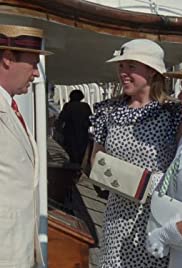
PROBLEM AT SEA
UK, 1989, 50 minutes, Colour.
David Suchet, Hugh Fraser, Melissa Greenwood, Victoria Hasted, Roger Hume, Ben Aris, Dorothea Phillips, Sherry Shepstone, Louisa Janes, John Normington, Sheila Allen, Anne Firbank.
Directed by Renny Rye.
This is one of the earliest films in the television series of Agatha Christie mysteries with David Suchet as Poirot.
After filming one of the mysteries on the island of Rhodes, this film is set at sea, cruising the Mediterranean, a visit to Alexandria (with Greek settings standing in for the Egyptian city).
The plot is fairly straightforward, a group of characters on the yacht, including Poirot and Hastings, a group of rather ordinary people, except for Mrs Clapperton (Sheila Allen) haughty and obnoxious, are vain woman who is continually putting down her husband, John, John Normington. While everybody goes ashore, Mrs Clapperton is murdered. And she is murdered in a locked room.
Initial suspicion is on the steward who has stolen her jewels and wants to sell them in the market. However, Poirot assembles all the passengers, borrows a doll from the little girl, puts her behind the curtain and Poirot feigns a ventriloquist act, revealing that John Clapperton, with his music hall background, had already murdered his wife and pretended to be asking her to open the locked door.
Good to look at, fairly straightforward, clear solution.
1. The popularity of Agatha Christie mysteries? The television series with David Suchet as Poirot?
2. The settings at sea? The yacht, interiors? Alexandria, the use of Greek settings, busyness, crowds, bazaars? The musical score?
3. Poirot on the cruise, Hastings and his love for sport, the range of passengers, the captain and his assistant, the two older ladies and the music, the general and his past, the old man, the two young women, the Tollivers, Miss Henderson, Mrs Clapperton, her husband?
4. Mrs Clapperton, in the mirror, her history, vanity, intolerance, dominating her husband, humiliating him? Completely self-indulgent? Lacking audience sympathy? Her being murdered? The locked room, the steward and the stealing of the jewels and going to the market? The alibis? Everybody on shore? Her husband’s response? Sympathy for him because of his being dominated? Not playing bridge, showing the card tricks, the background of the music hall?
5. The scenes on shore, Miss Henderson and the bargain for the jewellery, her concern about John Clapperton? The two young women, going with of with him for the day? Poirot and his enjoying the tour, Hastings and his posing for the photos?
6. The Captain, the time of death, the locked room?
7. Poirot and the little girl, her doll, his going into the musical hall for the explanation, the use of the doll, the little girl, pretending to be a ventriloquist, explaining how John was able to imitate his wife’s voice?
8. An interesting mystery? Solution?
Published in Movie Reviews
Published in
Movie Reviews
Saturday, 09 October 2021 13:01
Agatha Christie's Poirot Affair at the Victory Ball
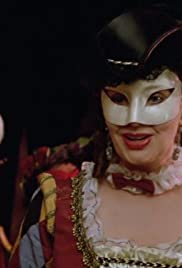
THE AFFAIR AT THE VICTORY BALL
UK, 1991, 50 minutes, Colour.
David Suchet, Hugh Fraser, Philip Jackson, Pauline Moran, Mark Crowdy, David Henry, Haydn Gwynne, Nathaniel Parker, Natalie Slater, Kate Harper, Andrew Burt.
Directed by Renny Rye.
This is one of the many short stories by Agatha Christie, a satisfactory murder mystery, part of the television series with David Suchet as Poirot.
The film has some exotic background with the characters from Italian traditions, Harlequin, peer and the others, with the visualising of statues and costumes. And, with adults in the costumes participating in the Victory Ball. And the ball itself is quite a lavish and colourful affair, many participants, fancy dress, the orchestra playing, dancing and, finally, masks off.
There is also a BBC background, a radio play with some of the characters actors in the play.
Poirot did not want to go to the ball, preferring to stay home organising his stamps, but Hastings, in 18th century costume, tells him that the BBC manager would find meeting him a highlight. Poirot goes.
One of the group, Viscount, is found murdered. There is a variety of suspects, of course. His cousin, needing money to buy china and statuettes succeeds him as Viscount. There is an American visitor, loud, looking for someone to marry, and money. There is the main actress who is found dead in her bed. There is a couple, he an actor at the BBC, she rather timid. Given the limited number of suspects, it is not too difficult to work out who the murderer might be.
The film uses the device of Poirot going on the BBC and solving the mystery on air, the suspects all present. He explains the situation, the murderer denies guilt, is found to be the supplier of cocaine for the actress, fabricates an alibi – and his caught out by catching one of the statues, thrown by Poirot, with his left hand but in his disguise, he is seen writing and waving with his right hand.
And there is a very good joke at the end with Poirot, pleased with himself, the switchboard crowded with calls – all criticising his English pronunciation!
1. The popularity of Agatha Christie mysteries? The television series with David Suchet as Poirot?
2. The London story? Poirot and is home and office? The presence of Hastings, the work of Miss Lemmon? Poirot and his stamps? The invitation to the ball, his reluctance, the flattery of meeting him as a highlight?
3. The Harlequin settings? The statuettes? The naming of each of the characters and their role? The Italian tradition? The friends and their dressing in the costumes? Participation in the ball?
4. The BBC, the building, the studios, the radio play, Coco and her arriving late? And then getting ready for the ball? The Viscount, the discussions with Ernest, his wanting money, his interest in china and statuettes? The Davidsons, the actor, the timid wife? Mrs Mallaby, the loud American? Widow? On the make?
5. Poirot and Hastings, the BBC producer, his welcome? Poirot enjoying the ball? Mrs Mallaby wanting to dance, Poirot nominating Hastings, her seeing the Viscount and calling to him? The importance of the timing, the costume, his writing the note?
6. The lavish ball, the range of people present, the range of the costumes, the dancing?
7. The atmosphere, Coco and her behaviour, Davidson taking her home, his wife remaining, overhearing the discussions about money? The importance of the timing?
8. The issue of cocaine, the container, Coco and her addiction, the mystery of her supplier, the argument with the Viscount, the suspicion that he was her supplier? Davidson taking her home, her going to bed, being discovered dead?
9. The discovery of the Viscount’s body, the knife? The autopsy, his clenched fist, the green pom-pom, the speculation as to where it came from?
10. The interrogations, suspicions? The invitation to Poirot to go on the BBC, his former reluctance? His sitting at the microphone, Hastings present, Miss Lemon and listening on the radio, the suspects all present?
11. The device of explaining the mystery, Poirot speaking, the lies, especially Davidson’s wife and the visit to the house, the costumes in the cupboard? Mrs Mallaby her witness? The older man becoming Viscount – and the visit to his house, the statuettes? Poirot explaining the characters and their characteristics? Mrs Davidson and the covering for her husband? Poirot accusing him, his alibi is, but his taking Coco, the drugs, supplying, killing her, his having killed the Viscount and hidden the body? The clutching at the pom-pom, the extra costume? Poirot throwing the statue – and his catching it with his left hand? Having been seen writing the note and waving with his right hand?
12. The presence of Chief Inspector Japp, collaboration with the investigation? His presence at the BBC?
13. The jokey ending, the switchboard full of calls, Poirot pleased, their all criticising his English pronunciation, Japp and his mention of lingo, and Poirot offering to send him his book on how English should be spoken?
Published in Movie Reviews
Published in
Movie Reviews
Saturday, 09 October 2021 13:01
All Day and a Night
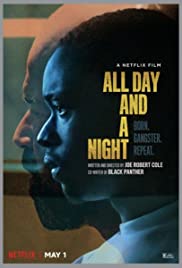
ALL DAY AND A NIGHT
US, 2020, 121 minutes, Colour.
Ashton Sanders, Jeffrey Wright, Isaiah John, Shakira Ja'nai Paye, Regina Taylor.
Directed by Joe Robert Cole.
This is a very grim film, especially in its beginning. The young man is sitting in a car, muttering, gets his gun, accosts a couple on a staircase, goes into their apartment, confronts them, shoots them in cold blood in the presence of the young daughter. Audiences will be repelled. He then goes to court, saying nothing, loudly condemned by the mother of one of the victims.
The setting is African- American life in the neighbourhoods, violence, gangs, executions.
This film, written by one of the contributors to Black Panther, Joe Robert Cole, who also directed the film, wants to explore life and expectations in the community. Gradually, the screenplay builds a picture of the young man, going back to his childhood, the brutality of his father, the hesitance of his mother, his being primed for survival in the violent world. And, as a young adult, he gets caught up in it, some brutal encounters with his friend, his girlfriend becoming pregnant, the ethos of loyalties.
This is the background to the initial murder, the screenplay making many points about the neighbourhood culture, the inherent violence, almost on un-escape from this world.
The latter part of the film is set in the prison where the young man is sentenced. His brutal father is there serving a life term. The father tries to bond with his son, looking out for him, protecting him, observing. What makes the difference to the young man is that his girlfriend is pregnant and is looking forward to having a child. And, this is one saving grace, especially after there is a fight in the yard, his close friend pulling a knife on him but the young man turning the tables and killing his friend.
His mother comes to visit and he is disdainful. However, she comes again with the girlfriend and the young child which, we see, has a transforming effect on the young man.
There is some symbolism of hope as the young man works in the garden, even explaining to his father about planting a shrub and producing life.
The young man is played by Ashton Sanders and his father by veteran, Jeffrey Wright.
1. A grim story? Possibilities for hope? Redemption?
2. An African- American story? Set in American society? The neighbourhoods? Impact for wider American audiences? World audiences?
3. The introduction to Jakhor, his full name including Abraham Lincoln, in the car, muttering, decisions, the gun, going to the house, the confrontation between the husband and wife, silent, shooting them in cold blood? In the presence of their daughter? The impact of this graphic and unexplained violence for the audience?
4. Jakhor, arrested, held, caught, the outburst of the mother and condemnation, his silence, going to prison?
5. The intercutting of his past, as a boy, his friends, the brutality of his father, strapping him, putting him down verbally, his stoic reactions? His father telling him that this is how he had to survive in the world? His mother, her presence? And not intervening? The film’s comment on society, family, physical violence, psychological violence, the consequences?
6. Jakhor growing up, as a young adult, his friends, the violent atmosphere, the drugs? Relationships? Friends? Guns and shooting? His girlfriend, her pregnancy? The information that she had played in the porn video? His violent reaction to her, condemning her, and her accusing him of infidelity? Issues of friendship, issues of loyalty, Malcolm and gangs, revenge? Orders, his shooting? His close friend, their activities together, perpetrating violence?
7. Jakhor in prison, his father serving a life sentence, his relationship with his father, their talking, his father defending him, his father watching out for him? With the other prisoners? The violence in the yard? His close friend in prison? Turned against him? Attacking him in the yard, the knife, Jakhor caught turning the tables, his friend’s death? The reaction of the guards?
8. The atmosphere of the prison, the range of prisoners, African- Americans, some whites? The attitude of the guards? Routines, cells, activities?
9. Jakhor and his attitude towards his mother, grandmother, their visits? His memories of them? The characters, change of heart?
10. The importance of his girlfriend, the pregnancy, giving birth, the effect of the birth on him, memories of his childhood, the photo of his father with him as a baby, the flashbacks to this sequence?
11. The visit, the older women, his girlfriend, the baby and its effect?
12. His withdrawing, working in the garden, explaining to his father about planting a shrub?
13. Jakhor and his future – prison, change of heart, a better life?
Published in Movie Reviews
Published in
Movie Reviews
Saturday, 09 October 2021 13:01
Hollywood
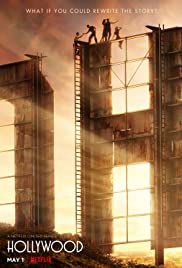
HOLLYWOOD
US, 2020, 350 minutes, Colour.
David Corenswet, Darren Criss, Laura Harrier, Joe Mantello, Dylan Mc Dermott, Jake Picking, Jeremy Pope, Holland Taylor, Samara Weaving, Jim Parsons, Patti Lu Pone, Maude Apatow, Mira Sorvino, Michelle Krusiec, Rob Reiner, Queen Latifah.
Directed by Ryan Murphy, Daniel Minahan, Michael Upendahl, Janet Mock, Jessica Yu.
Hollywood is a seven-part limited television series. It was produced by Ryan Murphy television, Murphy responsible for such series as Glee, American Horror Story, Pose, Feud: Bette and Joan. He collaborated in the writing and production and directed the first episode.
The setting is 1946 – 1948, the atmosphere in California and Hollywood with young veterans returning from World War II and dreaming of becoming film stars. This is the case with the central character, Jack, played by David Corenswet. He is tall and good-looking, stands outside the studios wanting to be called, is told by the casting director that his type as a dime a dozen. He is married and his wife (Maud Apatow) is expecting twins. He becomes involved in a prostitution ring, loves his wife, is deceived by her, does a screen test for an upcoming film, gets the role.
While his is the centre of the story, there are quite a number of principal characters. It is story of the studios at the time, the style of filmmaking, popular entertainment, the American audience, and a challenge by making films with more daring themes (1947 was the year of Elia Kazan’s Gentlemen’s Agreement, a critique of anti-Semitism, winner of the Oscar for Best Film).
While the film is generally bright and colourful, re-creating the period, sets and decor, costumes, and a range of popular songs of the period as background (and comment on the action and characters), it is not in any way documentary -like.
With Ryan Murphy’s perspective on Hollywood, and, especially, on sexual orientation, the series has been described as a “gay fantasy�. There is certainly an emphasis on gay characters throughout the series, relationships, love, exploitation with a number of the central characters being gay.
The final episode in the series, however, is an extreme example of the 21st-century going back into an alternate world of Hollywood, an indulgence in wishful thinking, if only…
The younger characters are effective in their way, but it is the veteran cast who tend to steal the show each time they appear. For the younger cast, there is David Corenswet as Jack, there is Jeremy Pope as the African- American screenwriter who has sent a screenplay to Ace Studios which has been accepted without the knowledge that he is black. There is Samara Weaving as the daughter of the studio owner, precocious and ambitious to be a film star. There is Darren Criss as the director who wants to make this film, his first, passing for white although, as he explains, he is part American, part Filipino (as is Criss in real life). And there is Jake Picking who is caught up in the casting issues, the casting couch (gay).
In fact, his character is Roy Fitzgerald who becomes Rock Hudson. Part of the difficulty of this performance is that Roy Fitzgerald seems something of a “drip�, very slow on the uptake, very poor in screen tests, earnest and trying hard – and hard to believe that he is becoming Rock Hudson. Roy Fitzgerald then meets the screenwriter and they live together.
But, it is the older actors who really are quite striking in their performances. Joe Mantello is very effective as the head of studio productions, shrewd, showing his ability in the rewriting of the film’s screenplay, able in studio work over 20 years, but, finally facing up to his sexual orientation and finding a partner.
Patti Lu Pone is most impressive as the wife of the studio owner, neglected by him as he conducts an affair (a very persuasive performance by Rob Reiner, Mira Sorvino as his lover). When he suffers a stroke, she becomes head of the studio, finds that she has abilities, and faces the issue of the greenlighting of the screenplay, which is based on the experience of the young star, Peg Entwistle who climbed to the top of the Hollywood sign and killed herself. The recommendation, after the screen test, is that a young black actress, Camille Washington, played by Laura Harrier, should be the star and that it be called Meg. There are all kinds of arguments against this, issues of the American South and racism and the banning of films, the Ku Klux Klan cross on fire outside the owner’s mansion, death threats, bigotry towards outsiders.
Also very strong is Jim Parsons as the actual agent, Henry Wilson, who promoted Rock Hudson. Here he is representing the worst in manipulative agents, exercising power, not afraid to call in the Mafia for some rough attacks on threatening journalists. Queen Latifah appears as Hattie Mc Daniel who won the Oscar, the first for an African- American, for Gone with the Wind. Other real life personalities in the film include George Cukor, famous for his parties and his association with gay men, Vivien Leigh, Tallulah Bankhead, and younger aspirants, Rory Calhoun, Tab Hunter, Guy Madison, all Henry Wilson is clientele.
There is also an acknowledgement of Chinese actress, Anna May Wong, who in the mid-30s was refused casting in The Good Earth, but who has an opportunity for appearing in Meg.
Making a very strong impression is Holland Taylor as a studio executive, who has a talent for casting, dramatic coaching, and has a yearning for the studio director. Playing quite against type from his other films is Dylan Mc Dermott as a former would-be star, proprietor of a garage which serves as a cover for a prostitution ring, customers coming by car and going off with his range of assistants by which include Jack and the screenwriter.
By the end, in the last episode especially, there is a huge wishful-thinking rewrite of Hollywood history. If only…
Meg is not only made, is rescued after the main negative was burnt and the editor had kept a copy, is released in over 600 cinemas, breaking box office records, audiences tolerant of racial issues, affirming them. And, at the Oscars, (where actual nominees for 1947 Oscars were read out), Meg not only wins best picture, but best direcctor, Best leading actress, best supporting actress, best screenplay. And the black playwright insists that he walk into the Oscar celebrations, arm in arm with Rock Hudson, for all the world to know. (Which, of course, was not how Rock Hudson lived his life and career, marrying is agent secretary as a cover, finally experiencing his AIDS crisis 40 years later.)
Some audiences took the film literally, were baffled by this wishful thinking, writing off the whole series. But, for those for whom Hollywood is a living legend, much to think about, quite a bit to be disgusted at, but thought-provoking about the lives of those involved in filmmaking, a different kind of entertainment.
Published in Movie Reviews
Published in
Movie Reviews
Saturday, 09 October 2021 13:01
Score to Settle, A
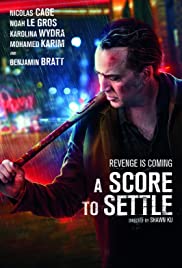
A SCORE TO SETTLE
US, 2019, 103 minutes, Colour.
Nicolas Cage, Benjamin Bratt, Noah Le Gros, Carolina Wydra, Mohamed Karim, Ian Tracey, Sean Owen Roberts, Bailey Coppola.
Directed by Shawn Ku.
A lot more value here than might have been expected . The IMDb comment showed how Nicolas Cage fans responded – and how the Nicolas Cage non-fans, irritated by his continually acting in action-oriented films responded – there were mixed reactions. The comments which came from those who did not expect much from Cage or his action shows, just another one, easily dismissible. However, there were others who found the drama, at least, above average.
This is a B-budget action drama, featuring the ever-present Cage (who seems to churn out almost half a dozen of your kind of film each year for the past decade), Canada-filmed, the supporting cast of lesser or little-known names. And, that title indicates a revenge film, of course.
But, writer and the director, Shawn Ku, seem to have given much more attention than might have been expected. There is much more in the screenplay concerning characters and situations but also an ultimate challenge to our sense of realism as we watch the shift to imaginative fantasy, our re-examining the truth of what we have seen.
The brutality of the opening is rather challenging. A gang boss is being coached as to how to swing a baseball pitch – and then our seeing that he is aiming at a victim, tied up, bleeding. The central character, Frank, coaching the boss who, ultimately, bloodily bludgeons his victim with the baseball bat. And then a shift, 19 years later, Frank in his prison cell, getting ready to leave. At this stage, there is little explanation, leaving it to us, to wonder about him, especially since there is no one to meet him. He then walks along the highway, seeing someone coming towards him, finding that it is his son, Joey, and they walk along the road together, looking for their old home, Frank digging up a suitcase full of cash, and their checking into a lavish hotel. Reconciliation? A new life? Reform?
This is one of Nicolas Cage’s much more restrained performances (though he does let loose with the touch of his expected maniacal outbursts later on), told by the doctor that his constant insomnia will lead to a physical collapse and his death. Has he decided to live without the revenge?
In retrospect, one of the best aspects of the screenplay is the relationship between father and son, the son who was abandoned, his mother dying, the gang bosses pledging that he will be looked after, his decline into addiction. He is initially tentative in his relationship with his father, but, pleasingly, there is a gradual growth in amicable bonding between father and son. However, Frank is intent on settling his score, the fact that he resented having been abandoned in prison for so long.
As he goes to meet his former friends, we realise that, especially as he buys a gun, he still is intent on being an executioner. This is jolting, watching the steps to revenge which we can understand but not approve of. But the film continues interesting in showing Frank’s continued physical collapsing, his encounter with the escort who contributes to humanising him, the disappearance of his son and his search for him, the discovery that he was deceived about the death of the boss, discovering in a scene with a compassionate nurse, that the target of his main revenge has been in coma for 15 years and did not betray his promise to look after Joey, a finale, in a church setting for a wedding, his realisation of the betrayal of his friend: and the moral of the story: what does it profit anyone to gain the whole revenge and risk the loss of their soul?
1. The title, revenge? Expectations? A Nicolas Cage action film?
2. The setting, the prologue and the bashing at night? Prison? The highway, the forest and digging up the trunk, the lavish hotel, interiors, bars, the hospital, the church and the wedding? The musical score?
3. The impact of the prologue, baseball, Frank coaching Max, the victim, searching for the ball outside, friendship with Q, other members of the gang, the brutal bludgeoning?
4. Transition to Frank, 19 years, getting out of prison, the doctor and the warning about insomnia and his physical condition?
5. Getting out, no one to meet him, walking along the road, encountering Joey, walking together, tentative, getting to know each other, Joe’s sense of abandonment, his drug addiction, Frank expecting him to be cared for by Max, going to prison for Max?
6. The suitcase of money, digging it up, going to the lavish hotel, the suite, the restaurant, meals? Joey and his hesitations?
7. The film’s treatment of the relationship between father and son, Joey slow, explanations, his addiction, the death of his mother, no contact with Frank? His becoming more friendly, supporting his father, eating together, talking, urging Frank to go with Simone? His disappearance, Frank finding him addicted, carrying him to safety?
8. The audience discovering that Joey was a fantasy, Frank’s subconscious, Joey offering some possibilities for Frank’s redemption?
9. Frank, tentative meeting with Simone, the night together, his awkwardness, the money, her becoming more compassionate, going for the drive, the scarf floating in the air, the next day, the wrong Simone, the pimp, Frank’s violence towards him? In front of the young man on the staff, his finding the addresses of the care institutions, witnessing its, frightened?
10. Frank going to see Q, the memories, Q and his prosperity, the prospect of his daughter’s wedding? Frank and the gun?
11. Frank not sleeping, going out, tracking down Tank, Tank’s acceptance of his death? The execution? Frank tracking down Dragon, with the girls, the fight, his running, Frank shooting his legs, the collapse, execution, the shot to the groin?
12. Frank, to the hospital, discovering that Max was in coma, 15 years, that he had not betrayed him? That Q had taken over? The kindliness? His leaving the two baseball bats, one bloodied, one clean?
13. The growing physical collapse? His going to Simone/Jennifer’s house, friendly with her little boy? Leaving the bag of money?
14. Going to the church, the guests, confronting Q, his daughter present, Q admitting the truth, Frank shooting his leg, the daughter shooting Frank? Going through the church, the police waiting, his acceptance of his death?
15. Joey, coming to meet him, an afterlife?
Published in Movie Reviews
Published in
Movie Reviews
Saturday, 09 October 2021 13:01
One of Us/ 2017
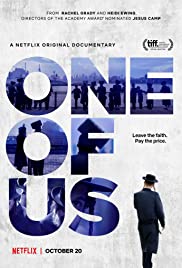
ONE OF US
US, 2017, 95 minutes, Colour.
Etty, Chani Getter, Ari Hershkowitz, Luzer Twersky.
Directed by Heidi Ewing, Rachel Grady.
In a number of fiction stories set in the Hassidic community in New York City, especially in Brooklyn, Williamsburg. In the past there was the film version of Chaiam Potok’s The Chosen in the 1980s. Then there was the striking limited series, Unorthodox, in 2020. Unorthodox, particularly, embodied all the elements portrayed in documentary fashion in One of Us.
There is quite a deal of visual background of life in the Hasssidic communities, in the synagogues, in the gatherings, the dancing of the men with the women outside watching and taking photos, the families together, in the streets.
There is great deal shown about the origins of these communities after World War II, the impact of the Holocaust, large families as compensation for the losses during the Holocaust. There is little education amongst the communities, especially for women. The women are dominated by their husbands and this kind of domination leads to a great deal of violence in the house, physical and psychological abuse. And, there is the indication that the courts of New York City make presumptions in favour of the Father and the community, the community finding all ways in law to protect their members. And, there is no Internet or worldly activities.
This film focuses on three, two men and a woman, who want to leave the community and are supported by a New York group, Footsteps, who have helped these three make transitions. The film also includes a number of talking heads, especially men and rabbis who are sympathetic to those they interview even though disagreeing with their choices. There are also support groups who offer celebrations and meals for those disaffected but who feel the need for some kind of continuance with their religious upbringing and to identify with being Jewish even if they say they are not religious.
Etty is the woman concerned, physical abuse from a dominating husband, leaving with her children, finding a new life. She is supported by her lawyer, Chani Gettner. In the interviews with Etty, there are explanations of what life in the community was like, with her husband, the dominance of the community, ultimately court cases in which she loses the custody of her children except for one supervised hour per week.
The older of the two men, Luzer, finds that he has lost his religious fervour, some of his beliefs, has walked away from his wife and family, has ambitions for acting both in California and in New York City, is shown doing interviews, discussions with some of the Jewish elders, some rehearsals, some recitations. He also examines documents and photos from his past, some affection from his father, his mother seeming to accept, by phone, his loss of being religious but then not speaking to him for years.
The younger man, Ari, is shown cutting off his locks, having a haircut, changing his clothes, separating himself from the community. He explains that he was raped by one of the authorities at a summer camp, made representations, but nothing was done and the man was still in authority at the camps. The film shows his moving to Florida, his searching out alternative religious styles, visiting a Pentecostal church, discussing in great detail what is like to be a young person cut himself off from the community, trying to find some meaning for his life.
At 95 minutes running time, this is an accessible opportunity to see something of the Hassidic communities, their religious beliefs and practices, their way of separate life, and the effect of the ex-Hassidic men and women.
Published in Movie Reviews
Published in
Movie Reviews
Saturday, 09 October 2021 13:01
Agatha Christie's Poirot Hickory Dickory Dock
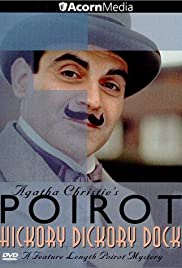
HICKORY DICKORY DOCK
UK, 1995, 103 minutes, Colour.
David Suchet, Philip Jackson, Pauline Moran, Paris Jefferson, Jonathan Firth, Damian Lewis, Gilbert Martin, Elinor Morriston, Polly Kemp, Jessica Lloyd, Sarah Badel, Rachel Bell, David Burke.
Directed by Andrew Grieve.
The title comes from the nursery rhyme, the mouse ran up the clock. In fact, right throughout the film, there is the visual motif of the mouse. And the hiding of the poison in the mouse’s hole.
It is set in the 1950s but, in accordance with the settings for the whole television series, the setting is now in the 1930s – with reference to the political upheavals of the time, a march from workers to London and the leadership of the politician, Sir Alfred Stanley (whom Inspector Japp had under suspicion for 10 years for the murder of his wife).
However, the focus is on a hostel for university students on Hickory Road, managed by Miss Lemon’s sister who invokes her help with some thefts, asking Poirot to intervene and his coming to dinner and giving a lecture to the students.
The owner of the boarding house, Mrs Nicoletis, is unmasked as participating in a diamond smuggling ring, in connection with a relative who manages a shop across the street.
The mystery of the kleptomania is quickly solved but then there are some murders. There is a range of students, the young man studying to be a doctor (Damian Lewis in an early role), a student studying psychology, a well-connected student, and some young women, one studying chemistry, and other politics, another fashion, and a scholarship student from the United States.
There are several murders, Poirot investigating, Chief Inspector Japp intervening (with flashbacks to Sir Arthur Stanley’s wife’s murder). There is also a great deal of humour because the chief Inspector’s wife is away, he has to do the housework himself, Poirot invites him to stay – and there are some problems with what is served up in the meals, the chief inspector finally cooking a proper English meal, including mushy peas and Spotted Dick!
There are various complications, each student being a possible suspect, except the American student who is revealed to be part of the team investigating diamond smuggling. The murderer is a surprise, is unmasked, Sir Arthur Stanley’s son, who also murdered his mother.
1. The popularity of Agatha Christie mysteries? The television series? David Suchét as Poirot?
2. 1955 novel? Transferred to the 1930s? University education? Boarding houses? The social context? The workers, the march to London? Sir Alfred Stanley and his political position?
3. The London setting, Hickory Road, the London streets, shops, fashion, the boarding house, interiors? The musical score?
4. Miss Lemon, her sister and the boarding house, her seeking advice, asking Poirot to help? His being invited to the meal, to give a lecture? The audience? Mrs Hubbard, Mrs Nicoletis and her hesitation? The range of the students? The responses?
5. The thefts, the audience seeing one of the thefts, the range of things stolen? The reappearance of the diamond in the soup? Celia, kleptomaniac, the support of Colin, his attraction towards her, also a case? Her confession? Her being murdered?
6. The men, Colin and his psychology course, interesting cases, the hypothesis of a murder, not been discovered? Leonard, his medical studies, the stethoscope stolen? His trip to the continent, the return with Sally? At customs? His rucksack? Nigel, his studies, confiding in Poirot? The decision about the case study, the taking of the poison, concealing it, its being substituted, Celia’s death?
7. The women, Patricia and her interest in politics, Sir Arthur Stanley, the visit to the archives, the photo? Her death? Celia, studies, kleptomania, the attentions from Colin? Her death? Valerie, fashion, the close-up of her stitching, the diamond in her soup?
8. Mrs Nicoletis, running the boarding house, her cousin in the shop across the street, the revelation about the diamond smuggling, Poirot examining the rucksack, the stitching, the special compartment? Mrs Nicoletis being murdered?
9. Sally, the trip with Leonard, the American, her English studies, her mistaking the Shelley quotation for Keats? The mysterious man watching the house? The revelation that they were investigating smuggling? Sally’s role?
10. Nigel, coming to Poirot, the explanation of the poison and concealing it, the phone call from Patricia?
11. Poirot confronting the group, the possibility for each of them to be the criminal? The revelation about Nigel, his father, and the suspicion of his wife’s murder?
12. Chief Inspector Japp, involvement in the case, the flashbacks to the situation with Sir Alfred Stanley, Japp overhearing conversation, his suspicions, 10 years?
13. Nigel, his animosity towards his parents, stealing, murdering his mother? And his presence at his father’s funeral? His arrest?
14. And the comedy with Japp staying with Poirot, the issue of continental meals – and the British food and Poiorot’s disdain?
15. The title? And the visualising of the mouse throughout the film?
Published in Movie Reviews
Published in
Movie Reviews
Saturday, 09 October 2021 13:01
Agatha Christie's Poirot Adventure of the Western Star
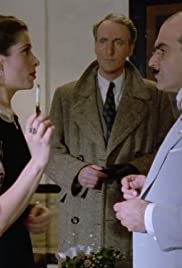
THE ADVENTURE OF THE WESTERN STAR
1990, 50 minutes, Colour.
David Suchet, Hugh Fraser, Philip Jackson, Pauline Moran, Struan Rodger, Rosalind Bennett, Oliver Cotton, Alistair Cameron, Caroline Goodall.
Directed by Richard Spence.
This is one of the early episodes in the television series of Agatha Christie mysteries with David Suchet as Poirot. It is not a murder mystery but the investigation of a robbery and fraud.
Poirot is very proud that the most famous Belgian actress has sought his help. It concerns a perfect diamond, the Western Star. There is a mythology about it – and the story of a companion jewel, the Eastern Star. The owner of the Eastern Star, Lady Yardley, Caroline Goodall, visits Poirot but is interviewed by Hastings, very pleased with his conduct of the interview.
Poirot and Hastings go to the Yardley estate, see the jewel, experience and attack on Lady Yardley and the disappearance of the jewel.
There are complications with a German broker and his sinister connections and wanting to buy jewels. Chief Inspector Japp is pursuing him. The villain of the piece is revealed as the Belgian actress’s husband, who had a connection with Lady Yardley and his blackmailing her.
There is a climax at Croydon airport and the mystery of their being only one jewel solved.
1. The popularity of Agatha Christie mysteries, the television series with David Suchet as Poirot?
2. A robbery story rather than a murder mystery? Poirot, Hastings, Chief Inspector Japp?
3. The apartment block, the office, Miss Lemon and her work and attention, Poirot and his investigations, Hastings and his accompaniment, his being pleased with his meeting and interrogation – and later reprimanded for missing the point?
4. Poirot, the setting for the reception of the film star, her not coming, at her flat, her reputation, her actor husband, the plan for filming at the country manor? The situation with her diamond? Her fears? Her husband, his manner?
5. The visit of Lady Yardley, Hastings’ interview, the threats, the diamond, its history, the eyes of the gods, Eastern Star, Western Star, stealing the jewel?
6. Van Brake, the interrogation, Van Brake let go? His contact with the jeweller? His visit to the Yardleys? The Chief Inspector following him?
7. Poirot and Hastings, the visit, Lady Yardley and the explanations, her husband dismissing the threat, her showing the diamond, her being grabbed, the jewel missing, the piece of cloth in the door?
8. Poirot and Hastings, returning to London, Chief Inspector Japp? The visit to the jeweller? The fake diamond? Poirot’s threats? Van Brake and his visit? The news about the fake diamond? His going to the airport?
9. The actress’s husband, the history of his blackmailing Lady Yardley, only one jewel, his going to the airport?
10. Everyone converging at the airport? The arrest?
Published in Movie Reviews
Published in
Movie Reviews
Saturday, 09 October 2021 13:01
Agatha Christie's Poirot Mystery of Hunters Lodge


THE MYSTERY OF HUNTERS LODGE
UK, 1991, 50 minutes, Colour.
David Suchet, Hugh Fraser, Philip Jackson, Diana Kent, Jim Norton, Shaughan Seymour, Roy Boyd, Bernard Horsefall.
Directed by Renny Rye.
This mystery is more complex than many of the other short stories in the early years of the television series of Agatha Christie mysteries with David Suchet as Poirot.
There is a briskness in the opening, the group out on the Moors hunting and shooting. The main characters are introduced in this context, the wealthy businessman who hosts the occasion, his half-brother who is the keeper of the property, one nephew an awkward schoolteacher, and the other a respectable businessman, present with his wife. Hastings is involved in the hunt. Poirot sits on a stool, reading a book about cooking the birds, then having to take to his bed because he is so cold after being in the countryside.
After a celebration back at the house, when the nephew goes back to school on his bike, the other gets a train to London. However, a mysterious character emerges from the train, steals the stationmaster’s bike. The owner is shot in his house, report of a mysterious man with a beard having come to the house.
Chief Inspector Japap also appears at the scene. The locals have a talented dog whom they employ in tracking down clues. The dog leads Poirot and the group to the bicycle buried, along with the mysterious beard. Everybody is assembled for reckoning about the murder and the dog sniffs out the wife, and the revelation that the mysterious housekeeper who kept to herself and the wife are one and the same person.
A satisfactory mystery, complications and solution.
1. The popularity of Agatha Christie mysteries? The television series with David Suchet as Poirot?
2. The outdoors and country setting? Hunting country, the open spaces, the shooting, the birds? Poirot sitting on his stool with his recipe book? The musical score?
3. The range of characters at the hunt? Harrington Pace as owner, the background of his Irish connections, doubledealing, making his money? Jack as his half-brother, the enmity between the two, Jack as the keeper? Archie, the teacher, the nephew, his awkwardness, shooting Harrington in the hand? Roger, nephew, business connections? Zoe, congenial, his wife? The scenes of the hunt?
4. The return to the house, the celebration, the work in the kitchen, Zoe and her headache, Mrs Middleton and her being in charge, the other members of the staff?
5. Archie, riding his bike, teaching at school? Jack, his work on the grounds? Roger, his return to London, in the train, the mysterious figure alighting at the next station, taking the stationmaster’s bike? The news of the bearded anonymous man at the door? The death of Harrington? The disappearance of Mrs Middleton who had announced the visitor, and had asked Jack to notify the police?
6. Poirot, Hastings, Poirot in bed, upset that the birds had been fed to the cats? The phone calls? The information, the interrogations? The plausibility of those who might have killed Harrington?
7. Going into the fields, the importance of the police dog, Mrs Harrington’s dress, the dog finding the buried bike and the beard, finally identifying Zoe?
8. Roger, his alibi, his gambling debts, the mystery person on the train, the identification of Zoe? Zoe and Mrs Middleton never together? The plan for the murder, the timing, Zoe and her ruthlessness?
9. The satisfactory murder mystery, complexity, clues, solution?
Published in Movie Reviews
Published in
Movie Reviews
Saturday, 09 October 2021 13:01
Reprisal

REPRISAL
Best, 2018, 89 minutes, Colour.
Frank Grillo, Bruce Willis, Jonathan Schaech, Olivia Culpo, Natalia Sophie Butler, Colin Egglesfield.
Directed by Brian A Miller.
Reprisal is the kind of action drama that audiences watch when they simply want an action show, robbery, car chases, confrontations, plenty of gunfire. And, it helps when the cast is led by Bruce Willis and Frank Grillo.
The Cincinnati locations make an impact, the city itself, the streets, the bridges, homes, warehouses, banks.
The central character, Jacob, played by Frank Grillo, is a bank manager of ten years. He has a loving wife, Olivia Culpo, a daughter with severe diabetes, prone to collapse. And he has a sympathetic next door neighbour, James, a former policeman, played by Bruce Willis in his knowing way.
The audience has seen the villain, played by Jonathan Schaech, preparing meticulously for a bank robbery, plenty of weaponry, military uniform, heavily disguised. The bank robbery is brisk, the robber using notes, not speaking, getting away quickly. The police are initially suspicious of Jacob.
Jacob is very disturbed by the experience, but is helped by James, maps, discussions, speculating on where the robber will strike next. They pinpoint various locations – and, just as Jacob is leaving, the villain appears. A chase through the city follows, the robber planning to hijack a van, Jacob disturbing the well-planned robbery. However, his wife and child are abducted, surveillance in his house, his having to return the money that he had taken from the hiding place the robber had used.
Some smart moves with James’s contacts, plenty of chase and pursuit, a lot of gunfire (very American style), the robber is killed, wife and child recovered, and a finale where Jacob will trained as a policeman (in the tradition of his father).
Nothing more, nothing less.
1. The title? Motivations? Gabriel? Jacob?
2. The Cincinnati settings, the views of the city, the river and bridges, the streets, buildings, bank, warehouse, aged care? Feel of the city? The musical score?
3. The introduction to Jacob, bank manager, relationship with Christina, with Sophia, her diabetes, the need for diet, her collapsing? Christina and her work with children? Jacob and work in the bank?
4. The introduction to Gabriel, the preparations for the robbery, armed, disguised, helmet? The entry into the bank, the huge lock, the rifles, not speaking, the notes, shooting the guard, the employees and their fear, opening the safe? His escape?
5. The role of the police, interrogating Jacob, suspicions? Christina and her concern? His return home, unable to sleep, the drinking, preoccupation? The memory of his father as policeman, his death?
6. James, the neighbour, former policeman, supporting Jacob, the discussions, the maps, Internet for identifying the lock, the speculation about where he would hit again? Robberies for cash, guns? James and his contacts for backup?
7. Gabriel, the aged care home, his father and his confusion, drinking, Gabriel taking stances? Defying the authorities? His father’s warehouse, Gabriel’s set up, the targets and models, his practising shooting and attack, making measurements? Eventually going out, on the bike?
8. Jacob, the speculations, going to different sites? Contact with James? His seeing Jacob? Following him? The chase through the city, the van, Jacob’s attack, opening the van, the robbery? The continued pursuit, Jacob with the money, Gabriel’s return, Jacob going home?
9. The surveillance and the house, Gabriel taking Christina and Sophie? James and his contacts, supplying the earpiece to Jacob, the contact, eventually rescuing Christina and Sophie, the ambulance?
10. Gabriel, the confrontation with Jacob, wanting the money back, James and his initial suspicions with Jacob having the money?
11. The setup, the pursuit, the amount of shooting? Jacob and his escapes? Eventually shooting Gabriel? The family safe?
12. Jacob, change of heart, joining the police force?
Published in Movie Reviews
Published in
Movie Reviews